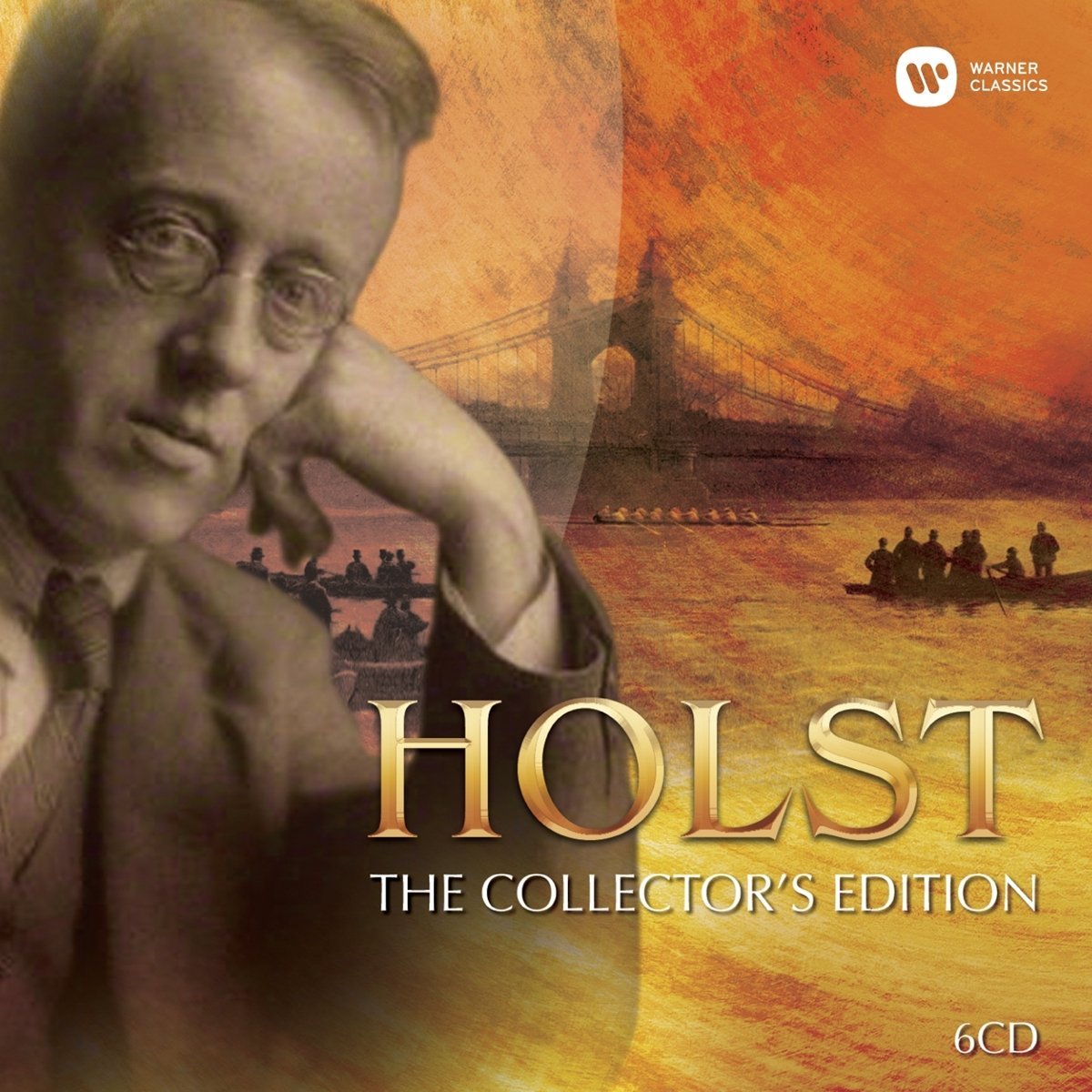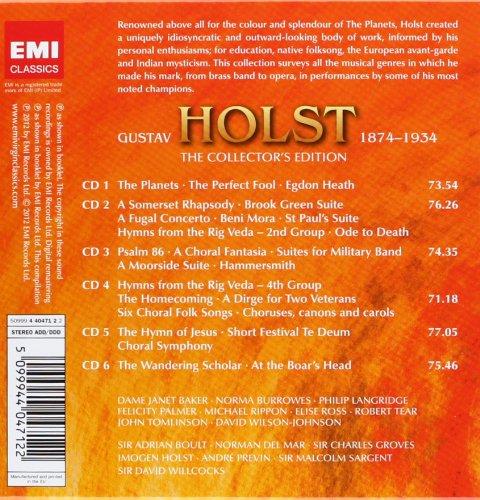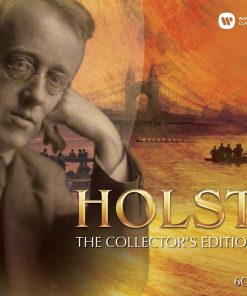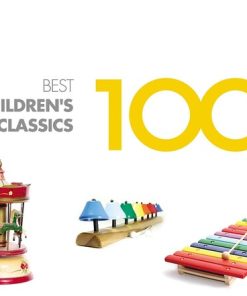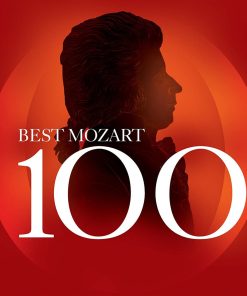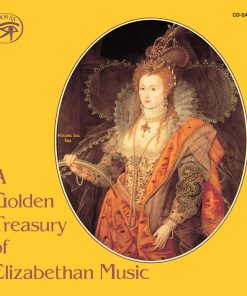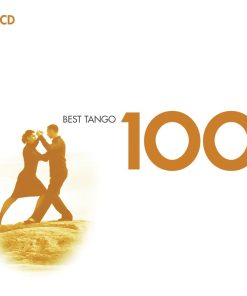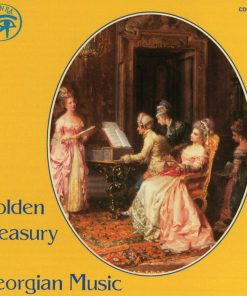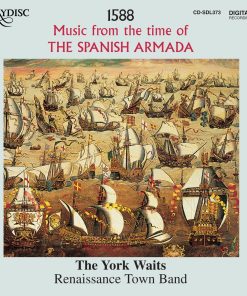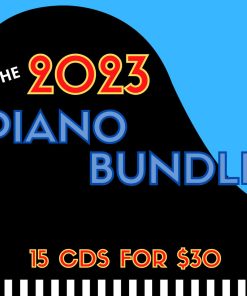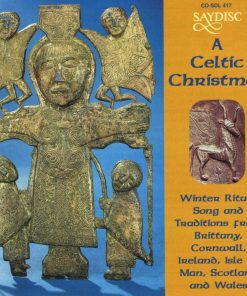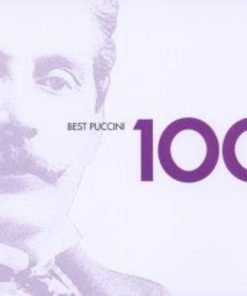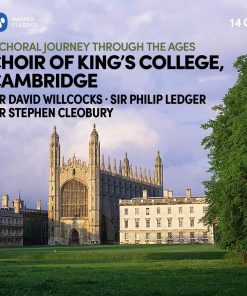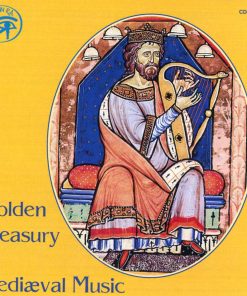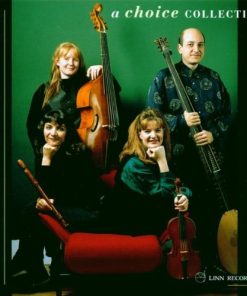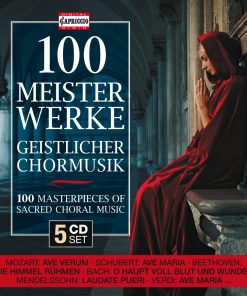Holst: The Collectors Edition (6 CDs) Warner Classics
$ 28,99 $ 17,39
Holst: A Choral Fantasia, H177
Holst: A Dirge for Two Veterans, H121
Holst: A Fugal Concerto, H152 Op. 40 No. 2
Holst: A Moorside Suite
Holst: A Somerset Rhapsody, Op.21 No. 2
Holst: At the Boar’s Head – A musical interlude in one act, Op. 42
Holst: Beni Mora, Op. 29 No. 1
Holst: Bring us in good ale
Holst: Brook Green Suite
Holst: Choral Folksongs (6), Op. 36b, H136
Holst: Choral Hymns from the Rig Veda, Op. 26: 2nd Group, H98
Holst: Egdon Heath, a homage to Thomas Hardy, Op.47
Holst: Eight Canons, H187: Truth of all Truth
Holst: First Choral Symphony, Op. 41, H155
Holst: Hammersmith – Prelude and Scherzo, H178, Op. 52
Holst: In the Bleak Mid-winter (Cranham)
Holst: Lullay my liking, H129, Op. 34 No. 2
Holst: Ode to Death, H144
Holst: Personent Hodie
Holst: Psalm 86
Holst: Short Festival Te Deum, H145
Holst: Six Choruses for male voices, H186
Holst: St Paul’s Suite, Op. 29 No. 2
Holst: Suite No. 1 for Military Band in E flat major, Op. 28 No. 1, H105
Holst: Suite No. 2 for Military Band in F major, Op. 28 No. 2, H106
Holst: The Homecoming, H120 (Hardy)
Holst: The Hymn of Jesus, H140
Holst: The Perfect Fool, Op. 39/H 150: Ballet Music
Holst: The Planets, Op. 32
Holst: The Planets: Jupiter
Holst: The Wandering Scholar, Op. 50
Holst: Turn back, O man
Renowned above all for the colour and splendour of The Planets, Holst created a uniquely idiosyncratic and outward-looking body of work, informed by his personal enthusiasms; for education, native folksong, the European avant-garde and Indian mysticism. This collection surveys all the musical genres in which he made his mark, from brass band to opera, in performances by some of his most noted champions.
Gustav Holst was born in Cheltenham on 21st September 1874. He learnt the piano from early age but, suffering from asthma and short sight, he found it hard. At the age of seven his mother died. He began to compose at Cheltenham Grammar School with Berlioz’s treatise on instrumentation as his guide and at seventeen he was conducting local village choirs. The neuritis in his right arm had convinced his father that he would never become a solo pianist so he was allowed a few months in Oxford to learn counterpoint before moving to London to study composition with Stanford.
He entered the Royal College of Music in 1893 but did not win a scholarship until two years later – Stanford found him hardworking rather than brilliant. His compositions tended to be saturated with imitations of Wagner. In 1895 he met Vaughan Williams and for the rest of his life they would play sketches of their latest compositions to each other.
He was invited to conduct the Hammersmith Socialist Choir in William Morris’s house where he met his future wife. He became fascinated by Hindu literature and philosophy to such an extent that he decided to learn Sanskrit – his Rig Veda settings are testament to this interest. He had also studied the trombone at college and it was this which brought him employment, with the Carl Rosa Opera and the Scottish Orchestra, if detracting him from his wish to compose.
Luckily he was appointed a teacher first in Dulwich and then at St. Paul’s in Hammersmith where he would be director of music, a position he held for the rest of his life. With security of income he was able to devote himself more to composition and a string of works by which he is best known, chief of which is The Planets, appeared. Their success made publishers want to revisit his earlier works and he found the extra work of correcting proofs time-consuming. His later works were more intense and the public found them harder to understand and it is only now, with a greater chance to listen to them, that we can fathom their genius.
His final years were blighted by illnesses which started after falling from the rostrum and hitting his head, he suffered from headaches and sleeplessness. In 1927 Cheltenham gave him his own festival and in 1930 he accepted the gold medal of the Royal Philharmonic Society. In 1932 he went to Harvard University to lecture but a severe attack of haemorrhagic gastritis caused him to return home and spent the next eighteen months in and out of clinics and, although In frequent pain, he kept on composing. In May 1934 he had an operation in London died on the 25th.
Artists
Jonathan Snowden (flute) & David Theodore (oboe), Ian Partridge (tenor) & Ralph Downes (organ), Dame Janet Baker (mezzo-soprano) & Ralph Downes (organ), Frederick Harvey (baritone) & Gerald Moore (piano), Richard Seal (organ), Edwin Bates (organ), Felicity Palmer (soprano), Michael Rippon (Louis), Norma Burrowes (Alison), Michael Langdon (Father Philippe) & Robert Tear (Pierre), Philip Langridge (Prince Hal), John Tomlinson (Falstaff), Elise Ross (Hostess), Felicity Palmer (Doll Tearsheet), David Wilson-Johnson (Pistol), Peter Hall (Peto), Richard Suart (Bardolph) & Michael George (Poins)
London Philharmonic Orchestra & Geoffrey Mitchell Choir, London Symphony Orchestra, Bournemouth Sinfonietta, English Chamber Orchestra, BBC Symphony Orchestra, Royal Philharmonic Orchestra, London Symphony Chorus, women’s voices, London Symphony Chorus & London Philharmonic Orchestra, The Purcell Singers & English Chamber Orchestra, Central Band of the Royal Air Force, BMC (Oxford) Band, Baccholian Singers of London, Baccholian Singers of London & Philip Jones Brass Ensemble, Baccholian Singers of London & English Chamber Orchestra, The King’s Singers, Choir of Chichester Cathedral, London Boy Singers, Bach Choir & Jacques Orchestra, Rodney Christian Fellowship Festival Choir, Choristers of St. Paul’s Cathedral Choir, London Philharmonic Choir & London Philharmonic Orchestra, English Opera Group & English Chamber Orchestra, Men’s voices of the Liverpool Philharmonic Choir & Royal Liverpool Philharmonic Orchestra, Sir Adrian Boult, André Previn, Norman del Mar, Yehudi Menuhin, Sir Malcolm Sargent, Sir Charles Groves, Imogen Holst, Wing Commander J.L. Wallace, Ian Humphris, John Birch, Jonathan Steele, Sir David Willcocks, Rodney Smith Bishton, Steuart Bedford, David Atherton
Â
Â
Fast Shipping and Professional Packing
Due to our longstanding partnership with UPS FedEx DHL and other leading international carriers, we are able to provide a range of shipping options. Our warehouse staff are highly trained to pack your goods exactly according to the specifications that we supply. Your goods will undergo a thorough examination and will be safely packaged prior to being sent out. Everyday we deliver hundreds of packages to our customers from all over the world. This is an indication of our dedication to being the largest online retailer worldwide. Warehouses and distribution centers can be located in Europe as well as the USA.
Orders with more than 1 item are assigned processing periods for each item.
Before shipment, all ordered products will be thoroughly inspected. Today, most orders will be shipped within 48 hours. The estimated delivery time is between 3-7 days.
Returns
The stock is constantly changing. It's not entirely managed by us since we are involved with multiple parties such as the factory and our storage. The actual stock can fluctuate at any time. Please understand it may happen that your order will be out of stock when the order is placed.
Our policy is valid for 30 days. If you haven't received your product within 30 days, we're not able to issue either a return or exchange.
You are able to return a product if it is unused and in the same condition when you received it. It must also still remain in the original packaging.
Related products
MUSIC CDS
MUSIC CDS
MUSIC CDS
MUSIC CDS
MUSIC CDS
MUSIC CDS
MUSIC CDS
MUSIC CDS
